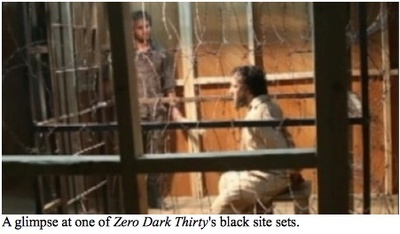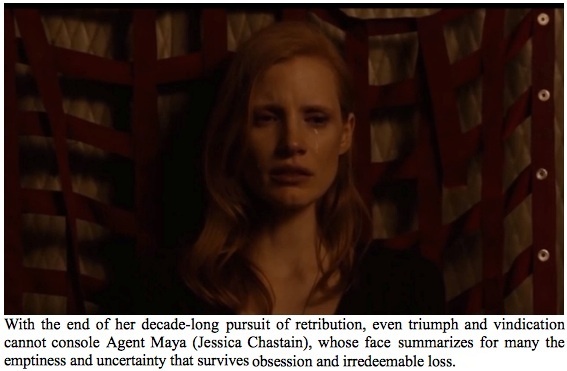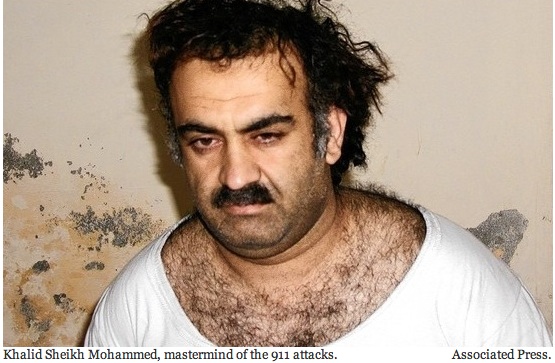
In the weeks preceding the release of the hotly-debated film, Zero Dark Thirty, something remarkable happened. The CIA, the Senate Intelligence Committee, and a coterie of human rights activists, journalists and artists, seemed to have formed a united front against the film, which by now everyone must know is about one CIA agent's single-minded mission to find Osama bin Laden. Their common aim was to impress on the public the view that the film falsely implies that the use of waterboarding and other "enhanced interrogation techniques" (to use the Bush administration's euphemism for torture) inflicted on suspected al Qaeda detainees resulted in the surrender of intelligence leading to the location of bin Laden's hidden refuge in Abbottabad, Pakistan.
If this makeshift alliance seems at all disorienting or disingenuous, it is because, as the archives of the news organizations and the blogosphere confirm, in the weeks leading up to and following the U.S. raid on the Abbottabad compound, things didn't seem so assured or so consenual in the public discussion of the measures being taken in the War On Terror. In fact, Congress, the intelligence community, the media, and the American public, were all widely at variance in their views on the use of waterboarding specifically, and on torture in general, even if such techniques assured the security of the U.S. and its allies. The intelligence community in particular was beset by inconsistency and outright contradiction in their comments to the press, including in the statements made by a number of the highest-ranking CIA officials who openly celebrated waterboarding as the technique by which intelligence agents obtained the name of the courier who was bin Laden's link to the outside world.
The following citations and excerpts from American news archives and blogsites compose a picture of the Bush and Obama administration's policies on waterboarding between 2004 and 2011--the period in which Zero Dark Thirty was being researched, written and filmed. Even if the film's writer, Mark Boal, and its director, Kathryn Bigelow, had been granted access to classified information regarding the treatment of detained al Qaeda operatives and the process of locating the Abbottabad compound, the archived sources verfy that the film's script, in fact, keeps so close to the accounts that had been aired publicly over the last decade, especially throughout 2011, that there seems to have been little if any need for the filmmakers to obtain clearance for deeper detail. The larger international events that we can watch unfold onscreen in Zero Dark Thirty--particularly those pertaining to torture and intelligence--are all corroborated by the news reports and blogs made before, during and after the hunt for bin Laden.
From the Archives: 2004 - 2011
2004: With the news about abuses at Abu Ghraib, Americans learn of how waterboarding has been one of the favored methods of "harsh" and "coercive" interrogation imposed on enemy detainees for seven decades. From the beginning of such reports, Senator John McCain, who was tortured during his imprisonment in Vietnam, remained consistent in his opposition to the use of waterboarding and all other forms of torture by the United States.
February 2008: In a meeting with the Senate Intelligence Committee, former CIA Director Michael Hayden discloses that "only three detainees" had been waterboarded -- Khalid Sheikh Mohammed, Abu Zabaydah, and Abd Al Rahim al-Nashiri--and that no one else had been subjected to the process since 2003. According to Cora Currier of Pro Publica, this was the first time a CIA official had confirmed the use of waterboarding.
April 18, 2009: Marcy Wheeler of the emptywheel blog publicly discloses that she discovered a memo sent to John Rizzo, Senior Deputy General Counsel to the CIA, dated May 30, 2005. The memo contains the number of times detained al Qaeda members were waterboarded. The number, she explains, came from a CIA report based on "torture tapes as well as other materials" and "is presumably a number that was once backed up by video evidence."
"According to the May 30, 2005 [memo written by Principal Deputy Assistant Attorney General, Stephen Bradbury], Khalid Sheikh Mohammed was waterboarded 183 times in March 2003 and Abu Zabaydah was waterboarded 83 times in August 2002."
"The same OLC memo passage explains how the CIA might manage to waterboard these men so many times in one month each (though even with these chilling numbers, the CIA's math doesn't add up)."
"'...where authorized, [waterboarding] may be used for two "sessions" per day of up to two hours. During a session, water may be applied up to six times for ten seconds or longer (but never more than 40 seconds). In a 24-hour period, a detainee may be subjected to up to twelve minutes of water application. ...Additionally, the waterboard may be used on as many as five days during a 30-day approval period.'"
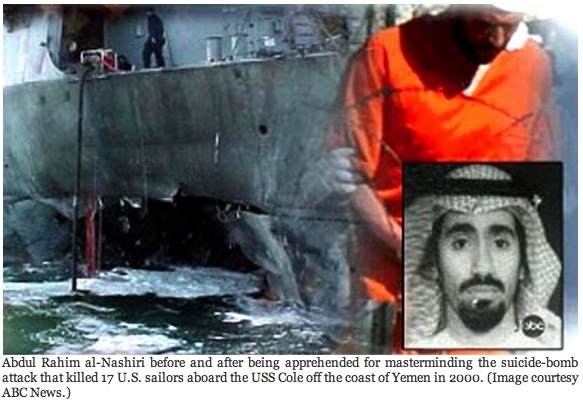
November 9, 2010: Matt Lauer of NBC sat down with former President George W. Bush to discuss the release of his autobiography, Decision Points, which includes a section evaluating the waterboarding of Abu Zabaydah.
LAUER: You talk about Khalid Sheikh Mohammed. There's another guy you write about in the book, Abu Zabaydah, another high profile terror suspect. He was waterboarded. By the way, Khalid Sheikh Mohammed was waterboarded, according to most reports, 183 times. This guy was waterboarded more than 80 times. And you explain that his understanding of Islam was that he had to resist interrogation up to a certain point and waterboarding was the technique that allowed him to reach that threshold and fulfill his religious duty and then cooperate. And you have a quote from him. "You must do this for all the brothers." End quote.
BUSH: Yeah. Isn't that interesting?
LAUER: Abu Zabaydah really went to someone and said, "You should waterboard all the brothers?
BUSH: He didn't say that. He said, "You should give brothers the chance to be able to fulfill their duty." I don't recall him saying you should water -- I think it's -- I think it's an assumption in your case.
LAUER: Yeah, I -- when "You must do this for --"
BUSH: But...
LAUER: ..."All the brothers." So to let them get to that threshold?
BUSH: Yeah, that's what-- that's how I interpreted. I -- look, first of all we used this technique on three people. Captured a lot of people and used it on three. We gained value -- information to protect the country. And it was the right thing to do as far as I'm concerned.
May 2, 2011, approximately 12:30 a.m.: Osama bin Laden is killed by a team of Navy Seals in a compound in Abbottabad, Pakistan. Later that morning his body is disposed of at sea, in keeping with the Muslim requirement of burial within 24 hours of death.
May 3, 2011: The day after Osama bin Laden was killed, CIA chief Leon Panetta, in an interview with NBC News anchor Brian Williams, confirmed that "enhanced interrogation techniques were used to extract information that led to the mission's success." Panetta went on to explain that waterboarding was among the techniques used and was used successfully. He also made clear that the CIA, "had a multiple series of sources ... that provided information with regards to the situation. Clearly some of it came from ... the interrogation of detainees but we also had information from other sources as well."
Later that same day on Fox News, former Secretary of Defense, Donald Rumsfeld, confirmed to Sean Hannity that bin Laden was found as a result of waterboarding, while clarifying that an earlier report claiming he stated waterboarding had not produced relevant information was a miswording. That he actually stated that no detainees at Guantanamo had been waterboarded. Rumsfeld went on to say that waterboarding had been productive in other locations, such as "black prison" locations in Romania, where waterboarding is thought to have been used by the CIA or their unknown associates.
Also on May 3, The Atlantic's Chris Good reported that White House Press Secretary Jay Carney did not answer yes or no when he was asked at that day's press briefing, whether harsh interrogations yielded relevant intelligence. Carney stated:
"The fact is that no single piece of information led to the successful mission that occurred on Sunday, and multiple detainees provided insights into the networks of people who might have been close to bin Laden. But reporting from detainees was just a slice of the information that has been gathered by incredibly diligent professionals over the years in the intelligence community."

May 3-4, 2011. Although WIRED's Spencer Ackerman is intent on showing that "the torture program established by the CIA played a minor role in the intelligence effort that eventually lead to Osama bin Laden's death," Ackerman notes that after Khalid Sheikh Mohammed was captured in Pakistan in 2003, a U.S. official tells the Associated Press that Mohammed gave up the courier's nom de guerre, Abu Ahmed al-Kuwaiti, while being interrogated in one of the CIA's brutal "black site" prisons. "That's not the same thing as saying the 183 waterboarding sessions Mohammed received led interrogators to the nom de guerre," he writes. "But let's be charitable to them and presume it did." But in weighing out Ackerman's implications, we don't have to be charitable to see that waterboarding cannot be extricated from the complex of methods contributing to Mohammed's altered state of mind, and which impel him to finally disclose the courier's name.
May 4, 2011: Both NBC and Fox News report that examinations into the legalities of the raid that allegedly led to the death of bin Laden prompted this statement from Representative Peter King (R-N.Y.), who was then the House Homeland Security Chairman:
"I have spoken with people who are very close to the investigation who say that initial information came from Kalid Sheik Mohammed after he was water-boarded, directly relating to the courier. The road to bin Laden began with waterboarding ... waterboarding is a moral imperative that saves lives."
Ironically, upon hearing that the Obama administration had warmed up to the film then being made by Bigelow and Boal about the pursuit of bin Laden, King called for an investigation into the likelihood that the filmmakers were given confidential information, presumably to ramp up the President's standing among security-minded voters.
May 6, 2011: In an op-ed in The Wall Street Journal, Michael Mukasey, former U.S. attorney general under the Bush administration, stated that the trail to bin Laden "began with a disclosure from Khalid Sheikh Mohammed" made after he had been subject to waterboarding. Mukasey said that Mohammed had revealed "the nickname of a trusted courier of bin Laden." He went on to say that "as late as 2006 fully half of the government's knowledge about the structure and activities of al Qaeda came from harsh interrogations."
In the days following Mukasey's op-ed, former Bush administration officials came forward to support the CIA's use of enhanced interrogation techniques and to criticize President Obama for signing an executive order that limited the use of interrogation techniques to the less harsh ones found in the military's Army Field Manual.
May 12, 2011: The changing governmental sentiments on waterboarding now pivots on the floor of the Senate, where John McCain makes an impassioned speech aimed at Bush apologists and their advocacy of waterboarding.
"With so much misinformation being fed into such an essential public debate as this one, I asked the Director of Central Intelligence, Leon Panetta, for the facts. And I received the following information:
"'The trail to bin Laden did not begin with a disclosure from Khalid Sheikh Mohammed, who was waterboarded 183 times. We did not first learn from Khalid Sheikh Mohammed the real name of bin Laden's courier, or his alias, Abu Ahmed al-Kuwaiti--the man who ultimately enabled us to find bin Laden. The first mention of the name Abu Ahmed al-Kuwaiti, as well as a description of him as an important member of al Qaeda, came from a detainee held in another country. The United States did not conduct this detainee's interrogation, nor did we render him to that country for the purpose of interrogation. We did not learn Abu Ahmed's real name or alias as a result of waterboarding or any 'enhanced interrogation technique' used on a detainee in U.S. custody. None of the three detainees who were waterboarded provided Abu Ahmed's real name, his whereabouts, or an accurate description of his role in al Qaeda.'"
"In fact, not only did the use of 'enhanced interrogation techniques' on Khalid Sheikh Mohammed not provide us with key leads on bin Laden's courier, Abu Ahmed; it actually produced false and misleading information. Khalid Sheikh Mohammed specifically told his interrogators that Abu Ahmed had moved to Peshawar, got married, and ceased his role as an al Qaeda facilitator--which was not true, as we now know."
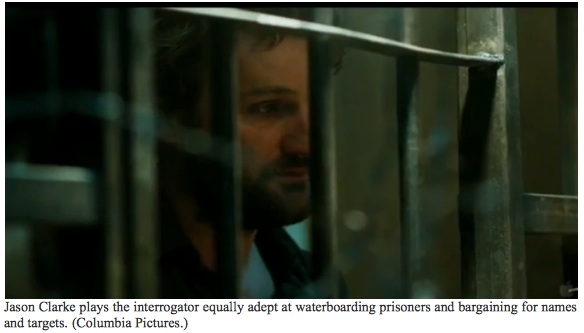
May 17, 2011: Ariane de Vogue of abcnews.go.com noted the marked change in Panetta's position in quoting him directly: "We first learned about the facilitator/courier's nom de guerre from a detainee not in CIA custody in 2002. In the end, no detainee in CIA custody revealed the facilitator/courier's full true name or specific whereabouts." But de Vogue extrapolates when she goes on to write, "The statement leaves open the possibility that both Mukasey and Panetta are correct. Panetta refers to the 'full true name' of the courier, while Mukasey said Khalid Sheikh Mohammed disclosed 'the nickname' in the course of the questioning that took place after the enhanced interrogation techniques. Mukasey said that while it wasn't the first time a detainee had mentioned the name, it only became significant 'when it came out of [Khalid Sheikh Mohammed's] mouth.'"
It is important to here note, that of all the accounts described in this post so far, it is Ariane de Vogue's scenario conflating the accounts made by Mukasey and Panetta that, in their combined complexity and ambiguity, match up with the events dramatized by Bigelow and Boal in Zero Dark Thirty.
On that same day, and contradicting Panetta's revised position, Diane Sawyer of ABC News reported:
"John Rizzo, who served as the CIA's general counsel during the Bush administration, said the CIA was always sure that 'couriers were the Rosetta stone' that would eventually lead to bin Laden. He said, however, that it is 'unknowable' whether bin Laden would have ever been captured had the CIA not had its interrogation program in place."
"'The purpose of the program was not to basically break detainees with these tactics so they'd blurt out the truth,' Rizzo said. 'The purpose of the program was to create a condition that would cause a detainee basically to give up hope and begin to be truthful in the answers.'"
"Rizzo said that 'personally' he doubted that 'any valuable information' could come from the top captured al Qaeda figures if the interrogators were limited to the Army Field Manual."
From this point in 2011, until news of the imminent release of Zero Dark Thirty reaches the public in the late autumn of 2012, the controversy over what account of waterboarding and its efficacy is largely withheld from public view. Director Kathryn Bigelow and screenwriter Mark Boal must have been stunned to find the intelligence community, the Senate Intelligence Committee led by U.S. Senators Diane Feinstein (D-Calif.), Carl Levin (D-Mich.), and John McCain (R-Ariz.), and a coterie of liberal journalists that included film director Alex Gibney, The New Yorker's Jane Mayer, and CNN.com's Peter Bergen, presenting a unified front against what they criticized as an "irresponsible" account of intelligence agents using waterboarding to obtain the name of bin Laden's trusted courier, and ultimately to track and follow him to the compound where he was hiding. As a result, the film, originally scheduled for an October release, was withheld until mid-December, and then in only limited release until January 11th, when a wider release is scheduled.
Dec 10, 2012: Joe Scarborough on his morning news program, Morning Joe, talks back to the journalists and members of Congress who have seemingly contrived a new history of state intelligence in their insistence that the makers of the film, Zero Dark Thirty, remove all scenes indicating that waterboarding led to the discovery of Osama bin Laden. More importantly, Scarborough recalls what the CIA's narrative on waterboarding had been under the Bush administration--the same narrative reflected in the film.
"The truth that Barack Obama learned in the first briefing that he got after he won the election is that the CIA program, whether you find it repugnant or not, actually was effective with [9/11 mastermind Khalid Sheik Mohammed] and other people getting actionable intelligence that led to couriers that eventually led years later to the killing of Osama bin Laden. ...I had to listen to people tell me on this program for years that the CIA didn't work. Waterboarding didn't work, and I knew that that was not true. It did get information from Khalid Sheik Mohammed and other terrorists that eventually led to not just the killing of Osama bin Laden but a lot of victories. And you can say it's immoral, you can say it's wrong..."
Scarborough is one of the few public figures vocalizing dismay and dissent over the "amnesia" that has gripped both the intelligence community, the Senate Intelligence Committee, and the media.
Why would the intelligence community in particular change its story so dramatically? There is always the possibility that the new narrative reflects the real causes and effects that transpired. But another credible answer is that since Panetta and King made their disclosures about the "efficacy" of waterboarding to NBC in May 2011, the CIA and government officials, including the Obama administration, could have come to recognize that an overt admission that waterboarding or other internationally illegal means of procuring information about bin Laden's whereabouts could also make the action that the U.S. took against bin Laden in Pakistan illegal. Of course, secrecy must also be excused regarding any national security issue, especially one as imperative as the hunt for Osama bin Laden involving agents and liasons whose identities must be protected. Finally, in retrospect, the breach of secrecy in the first days after the raid in Abbottabad may be accounted for as mere bravado, an ill-thought out act of hubris in a gleeful week of self-congratulation that issued illusory "facts".
The question remains, must the artists who produced Zero Dark Thirty be made scapegoats for the government's own breach of confidentiality and erratic accounts as a result of the Obama administration's, and the liberal Senate's, observance of an anti-coercive interrogation policy? And especially considering that Boal's and Bigelow's fiction closely reflects the complexity and contradictions expressed by the government and its intelligence community over the last decade?
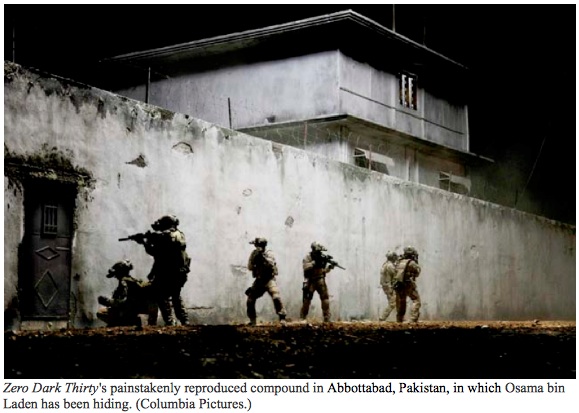
Update and Afterthought 1/9/13
Four days after I posted the above news articles and blogs verifying, if not contributing to the making of Zero Dark Thirty, the Senate Intelligence Committee on January 3rd issued the statement that they believe the CIA may have misled the filmmakers. It is yet one more turn in the erratic accounts issued by U.S. officials.
But this time the turn of opinion was anticipated by those of us who closely followed the contradictory reports concerning waterboarding and the hunt for bin Laden. The Senate Committee's recant of blame for the Zero Dark Thirty filmmakers seemed to many of the film's champions the only just outcome to an unjust indictment. But even in this second week of 2013, the damage done to the reputation of Zero Dark Thirty seems to threaten the chances of the film garnering the many Oscars that critics and filmgoers believe the film deserves. On the other hand, the range of commentaries attacking and defending the film at best indicate that we may never know what account truly represents the U.S. hunt for Osama bin Laden and the more general measures taken in the global War on Terror.
In this respect Zero Dark Thirty as much reflects the many contradictions recorded by the media and blogosphere from 2004 to 2012, as it does the full range of doubt and dissent expressed by the film's collective audience. Unfortunately, the film's many reviewers for the most part neglect to mention that in no one of Zero Dark Thirty's many characters or scenes does the story ever convey a sense of certaintude regarding what decision is best, whose authority is recognizable and reliable, or with whom one's trust can be rewarded. To further underline the depth of existential doubt gnawing at us as the film unfolds, Bigelow in the final scenes never permits us any more than an oblique glance at Osama bin Laden's corpse--despite that he is the reputed prize propelling both the real search and the film. In Bigelow's declinination to focus on the face of the murderer of thousands of civilians on four continents, we are for the first time made to consider that bin Laden the terrorist mastermind may not be the ultimate subject propelling Zero Dark Thirty after all. The subject at heart suddenly seems to be the quest for certainty itself--or at least some semblance of assurance that the corpse fleetingly shown deposited at sea is indeed that of Osama bin Laden.
Instead, we are emptied of assurances with the film's end, as we find our doubts mirrored in the sight of agent Maya (Jessica Chastain) flying from Afghanistan back to the U.S. while wearing not the expression of triumph for having found and eliminated public enemy #1, but a blank stare registering her bewilderment and loss of purpose. This final reading of emotional emptiness defines Bigelow's film and Boal's script as a commentary on what turns out be a hollow culmination of ten years (or 157 minutes) of cultural and cognitive disorientation for a civilization as much at war with itself as with a foreign enemy. In this dim light, Zero Dark Thirty seems to be as much about the dubious relations we have with our government and our media as with any enemy and foreign society. The film reminds us that at our core, we all harbor the ineluctable uncertainty that makes human beings perpetually fearful and dangerously defensive. Our uncertainties over race, ideology, faith, custom and class dominate a world made small within the last century by technology and its interfacing of peoples still new to one another despite the tens of thousands of years that our lineages have coexisted.
Sweeping nationalistic ideologies aside, Zero Dark Thirty makes it clear that human uncertainty undercuts the authority informing dictatorships and democracies, national and international entities alike. Such a subversion of authority becomes exceedingly magnified when we catch it, as Zero Dark Thirty shows it, emanating from the government halls--or the detention camps and black sites--of world powers, especially those devoted to the vain attempt at procuring reliable intelligence and an insular sense of security. For as we see throughout the film, even the most reliable intelligence procured by the richest and most powerful nation in the world is met with inexorable doubt and results in irreconcilable disillusionment.
Read other posts by G. Roger Denson on Huffington Post in the archive.

